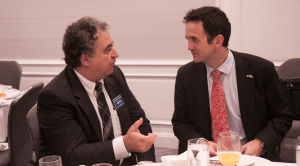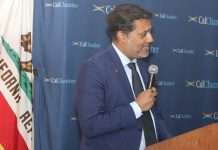Leaving the European Union is not about the United Kingdom cutting itself off from the rest of the world, British Consul General Andrew Whittaker emphasized last week in remarks to a California Chamber of Commerce audience.
Speaking at the CalChamber International Breakfast Meeting in San Francisco on December 8, Whittaker said the UK sees leaving the EU as an opportunity to develop “more ambitious” trade agreements and become “a real champion of global free trade.”

The meeting was sponsored by Shell Martinez Refinery, whose general manager, Thomas J. Rizzo, is a CalChamber Board member.
Timeline
At the end of March, UK Prime Minister Theresa May touched off the Article 50 exit clause of the EU treaty, giving the UK and EU until March 29, 2019 to reach agreement on the UK exit from the EU.
Whittaker noted that there also is a recognition that additional time will be needed for matters to be settled, so there will be an additional two-year transitional period concluding around 2021.
The next round of UK elections has to happen in 2022, he pointed out, and the government will want to campaign on having delivered the Brexit.
“Everything is up for negotiations,” he commented, predicting that discussions “will go right down to the last minute.”
Until the UK leaves the EU, it cannot negotiate its own trade agreements, Whittaker said, but “intense talks” about future relations with various trading partners, including the United States, are already occurring.
Common Ground
Unlike discussions for most free trade agreements, Whittaker pointed out, the UK-EU talks begin from having 40 years of exactly the same legislation and regulations.
Negotiators don’t have to face the pressure of how to remove barriers, he said. Instead, at the top of the list of concerns is how to minimize for the business community, the uncertainty that comes from Britain leaving the European Union.
An important message for businesses and investors, Whittaker said, is that they “don’t face a sudden dramatic shift on the day we leave” the European Union.
The difference, he said, is more one of where the governing entity is. After the exit, for example, a company will be subject to UK processes, rather than having the extra step of going to the European courts of justice.
Challenges
Whittaker outlined the UK’s industrial strategy, which identified four challenges for which business, academia, civil society and government will need to come together to work on:
l artificial intelligence and the use of data;
l clean growth—recognizing that “how we consume and produce energy needs to change”;
l future of mobility, including vehicles on the road, drones and the use of robotics; and
l aging society, recognizing that people are living longer and how that affects pensions and the future of health care.
Future
As the UK continues its preparations to leave the EU, Whittaker said, it will make sure it doesn’t lose sight of where it wants to be as a very forward-looking country in areas such as artificial intelligence, robotics, financial and professional services.
“We want to be sure the UK continues to be a world leader” across all those areas and “make sure we can help facilitate the development of trade and investment relations between our countries.”
Staff Contact: Susanne T. Stirling


